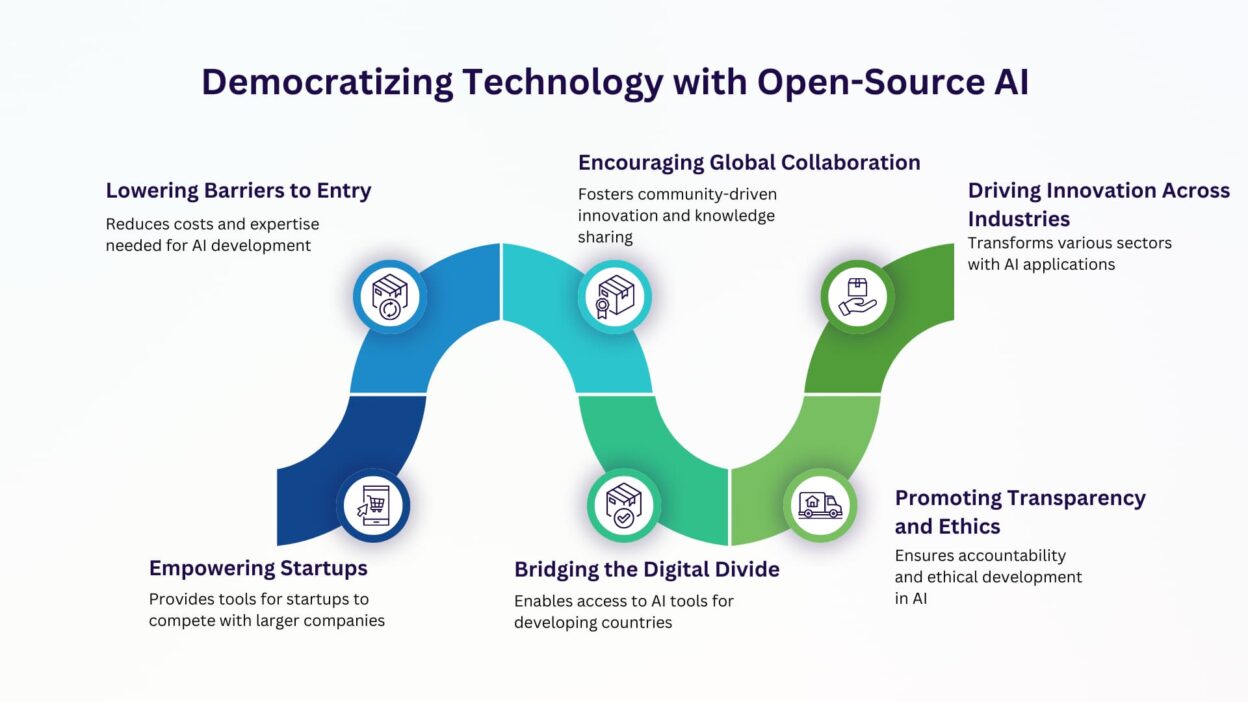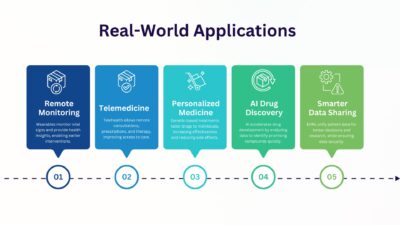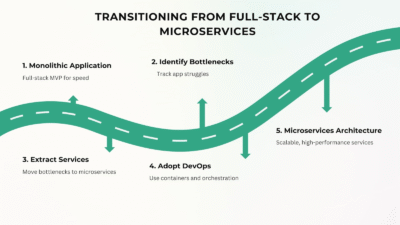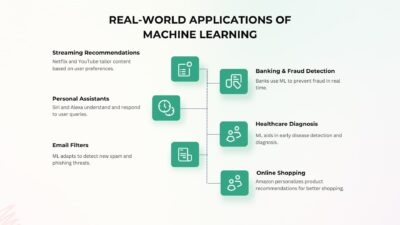Artificial Intelligence (AI) is no longer confined to big corporations or elite research labs. Thanks to the open-source movement, AI has become more accessible, affordable, and collaborative than ever before. Open-source AI is reshaping how businesses, startups, students, and developers build and use intelligent systems. From creating smarter apps to accelerating scientific discoveries, the democratization of AI is giving everyone a seat at the table.
In this blog, we’ll explore how open-source AI is transforming technology, what it means for innovation, and why this shift matters to the global tech community.
What Is Open-Source AI?
Open-source AI refers to artificial intelligence frameworks, models, and tools that are publicly available for anyone to use, modify, and distribute. Instead of being locked behind proprietary paywalls or licenses, these resources are shared openly with the world.
Examples of popular open-source AI projects include:
- TensorFlow and PyTorch (machine learning frameworks)
- Hugging Face Transformers (natural language processing models)
- Stable Diffusion (image generation models)
- Rasa (conversational AI)
Why Open-Source AI Matters
Traditionally, access to advanced AI was restricted to tech giants like Google, Microsoft, or IBM. They had the money, infrastructure, and talent to build powerful models. Smaller players often couldn’t compete. Open-source AI changes this dynamic by:
- Leveling the playing field – Anyone with internet access can experiment with cutting-edge AI models.
- Reducing costs – Free tools eliminate the financial barriers to entry.
- Fostering collaboration – Global communities work together to improve AI.
- Accelerating innovation – Open exchange of knowledge leads to faster breakthroughs.
How Open-Source AI Is Democratizing Technology
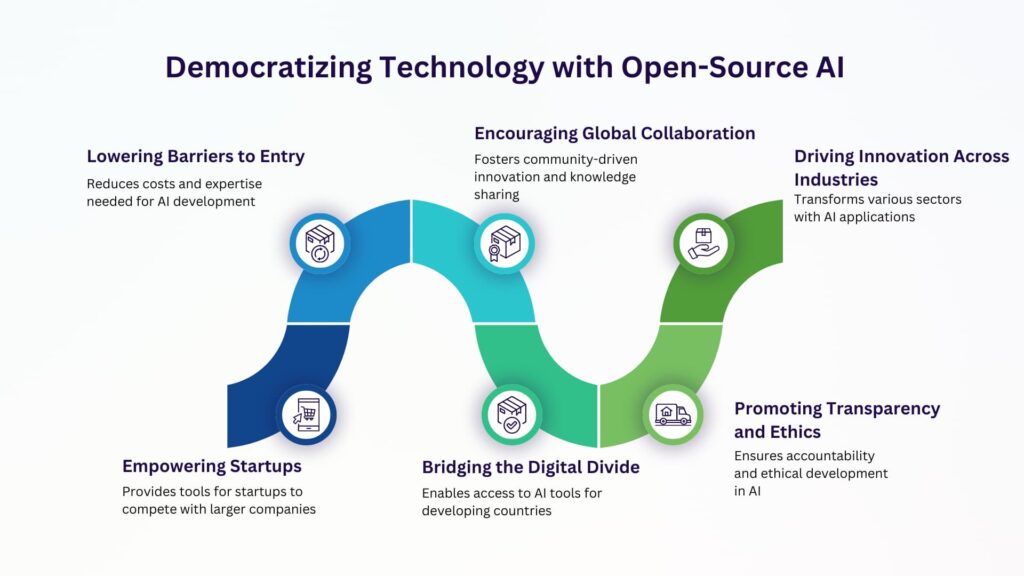
1. Lowering the Barriers to Entry
In the past, building an AI system required millions of dollars in computing power and years of expertise. Open-source AI dramatically reduces these barriers. Today, a student with a laptop can fine-tune a pre-trained model using free datasets. Startups can prototype AI products without heavy upfront investment.
For example, Hugging Face offers ready-to-use models that developers can integrate into apps with just a few lines of code. This accessibility opens doors for small teams and individuals to create solutions once thought impossible outside big tech.
2. Empowering Startups and Small Businesses
Open-source AI gives startups the tools to compete with larger companies. Instead of reinventing the wheel, they can build on existing models to create innovative solutions.
A small e-commerce business, for instance, can use open-source chatbots to provide customer support or recommendation systems to personalize shopping. Healthcare startups can use AI image recognition tools for diagnostics without investing in proprietary systems.
By reducing costs and accelerating development, open-source AI helps entrepreneurs bring new ideas to market faster.
3. Encouraging Global Collaboration
One of the strongest aspects of open-source AI is its community-driven nature. Developers, researchers, and enthusiasts from all over the world contribute to projects, fix bugs, share datasets, and enhance models.
This collective intelligence creates a culture of collaboration that benefits everyone. Knowledge is no longer siloed in one lab or company—it’s shared across borders. This collaborative spirit is crucial for solving global challenges, from climate change modeling to improving healthcare access in under-resourced regions.
4. Driving Innovation Across Industries
The democratization of AI is transforming industries far beyond tech. For instance:
- Healthcare: Open-source AI tools are being used to detect diseases, analyze medical images, and improve drug discovery.
- Education: Teachers can use open-source AI platforms to create personalized learning experiences.
- Agriculture: Farmers are using AI-powered apps to predict crop yields and detect pests.
- Media & Creativity: Artists are generating images, videos, and music using tools like Stable Diffusion.
5. Promoting Transparency and Ethics
Another key benefit of open-source AI is transparency. Proprietary AI often operates as a “black box,” where users don’t know how decisions are made. Open-source projects, by contrast, allow communities to inspect, audit, and improve code.
This openness ensures:
- Accountability in how algorithms work.
- Bias detection and correction by diverse contributors.
- Ethical development rooted in community standards.
6. Bridging the Global Digital Divide
AI should not be limited to wealthier nations. Open-source AI enables developing countries to access the same tools as advanced economies. Universities in Africa, Asia, and South America can use free AI frameworks for research and teaching. Nonprofits can build affordable solutions for local challenges like disaster management or rural healthcare.
This inclusivity helps bridge the global digital divide, ensuring that AI benefits humanity as a whole—not just a privileged few.
Challenges of Open-Source AI
While the benefits are immense, open-source AI also comes with challenges:
- Computational resources – Running large models often still requires expensive hardware.
- Data privacy – Open datasets may raise concerns about sensitive information.
- Skill gap – While tools are available, using them effectively still requires knowledge.
- Security risks – Open code could be misused for malicious purposes.
The Future of Open-Source AI
The future looks bright for open-source AI. As cloud services and hardware become more affordable, access to advanced AI will continue to grow. Communities like Hugging Face, OpenMined, and EleutherAI are pushing the boundaries of collaboration, creating models that rival proprietary systems.
We can expect open-source AI to play a central role in:
- AI education and training for future developers.
- Ethical frameworks that guide responsible AI use.
- Cross-industry partnerships that solve complex global problems.
Final Thoughts
Open-source AI is more than just free software—it’s a movement that’s reshaping technology, business, and society. By lowering barriers, fostering collaboration, and promoting transparency, it ensures that AI is not limited to a privileged few but accessible to all.
As more individuals, startups, and communities embrace open-source AI, we’ll see new waves of innovation that redefine industries and empower people worldwide. The democratization of AI isn’t just about technology—it’s about creating a fairer, more inclusive digital future.

